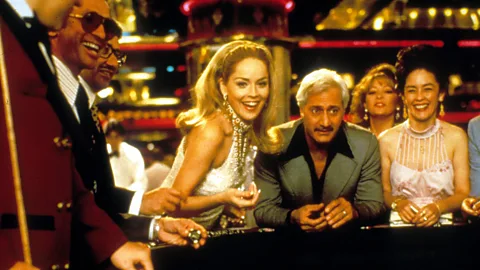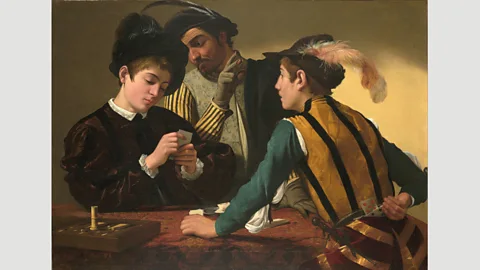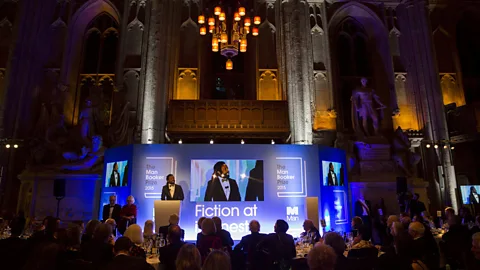Gambling on the arts: How bookies work out the odds
 Alamy
AlamyThe stakes are high in the world of gambling on the arts. Hannah Sander finds out how the bookies’ odds became a part of our cultural landscape.
The winner of this year’s Academy Award for best actress will probably be Brie Larson.
The 26-year-old actor stars in Room, an adaptation of Emma Donoghue’s best-selling thriller. Room has not yet been released in Europe and has only had a limited run in the United States. And whether or not Larson will even be nominated for the award will not be known until 15 January. Nevertheless, the loudest voice in the Oscars debate has spoken: Larson is now the bookies’ favourite for the prize.
The odds from betting firms are now a familiar part of news reporting on theatre, literature, art, cinema and architecture prizes. They predict the next conductor of every major orchestra. According to current odds, the next James Bond will be either Damian Lewis or Tom Hardy. The next musician to be awarded the million-dollar Birgit Nilsson Prize will be soprano Renee Fleming. And Leonardo DiCaprio will finally win best actor at the Oscars.
 A24
A24Britain’s biggest bookmakers moved into cultural gambling by accident. Ladbrokes was founded in 1886 as a private members’ club for horseracing enthusiasts. In 1963, facing declining fortunes, Ladbrokes bookmaker Ron Pollard began accepting bets on the next leader of the Conservative Party, and then on the next General Election. His odds made the front pages.
“Almost overnight the ‘specialist’ market was born,” explains David Williams, director of media at Ladbrokes. “Journalists started to come to us asking for odds on whatever they were covering: music, science, politics.” By the 1990s, Ladbrokes was hiring arts graduates to sit alongside the football and horseracing bookies.
Bookmakers William Hill began taking non-traditional bets with a colossal failure. Mr William Hill had learned his trade running illicit gambling dens in Jazz Age London before launching a string of shops. In 1964 a space enthusiast named David Threlfall wagered £10 that man would walk on the moon before the end of the decade. Hill accepted his bet with odds of 1000-1.
Threlfall’s bet was reported around the world and Hill’s company became famous. Punters rushed to place bets in his shop. When Neil Armstrong took his first steps on the moon Threlfall won £100,000 – nearly £2m ($3m) at today’s value. “That was a pretty big financial blow for us,” admits Graham Sharpe, William Hill’s media relations director. “Nobody wanted to make that mistake again! We thought we should stick with racing and football, which was what we knew – but the die was cast.” Today, their ‘specialist’ arts and politics pools bring in millions of pounds.
Long odds
The gambling industry may have been sceptical about speculating on the arts, but artists have long been keen on gambling. Caravaggio, Goya, Degas and Cezanne painted card sharks and poker players. Pushkin wrote the Queen of Spades, a supernatural thriller about a winning trick that drives betters mad. Gambling was considered a genteel activity. Rossini’s salary as music director of two opera houses in Naples included profits from the theatres’ gambling tables. More recently, Queen Elizabeth II has won over 1600 races with her thoroughbred horses and is said to read the Racing Post over breakfast.
 Wikimedia Commons
Wikimedia CommonsBeneath its veneer of opulence, the seediness of gambling enveloped artists. In A Rake’s Progress Hogarth showed gentlemen crumpling their expensive hats in despair, while behind them men brandished swords or cackled over gold. The hero of the prints, Tom Rakewell, is driven mad by his sordid habit.
“Suddenly I started to lose, couldn't control myself and lost everything,” Fyodor Dostoevsky confessed to his brother in 1863. “I had six napoleons d'Or left to pay the landlady and for the journey. In Geneva I pawned my watch.” Desperate for cash, the writer promised his publisher a new volume. The result was The Gambler: the tale of a young Russian intellectual who becomes addicted to roulette and loses everything.
A century later, Lucian Freud settled his own vast gambling debts with portraits painted on demand, including one of a pet gorilla. “Bookies inevitably became part of his life,” the newspaper editor Geordie Grieg recalled. “He painted them, talked to them often, borrowed off them, sold them pictures and sometimes got blind drunk with them.” Gambling cost Freud millions of pounds.
The rise of the internet produced a new breed of gambler. Websites allowed the educated middle classes to place bets without ever entering a betting shop. Arts gambling became a major industry, and the cultural world became hooked on the free publicity. In the US several Las Vegas casinos publish their Oscar predictions each year, even though betting on the awards is prohibited. Journalists monitor the odds closely, waiting to turn these fractions into headline news. Hollywood relishes the hype: audiences rush to watch the new Oscar favourite.
A bit of a flutter
Matthew Shaddick is head of political odds at Ladbrokes. His eclectic portfolio also includes the Nobel Peace Prize, the next Archbishop of Canterbury, the Booker Prize for literature, the Eurovision Song Contest, reality TV and the Oscars. “We usually start taking bets on the Oscars in the middle of the summer,” he says. “But a lot of our knowledge will be based on speculation. We set odds on films we have not yet seen.” He is bracing himself for a mad rush in February: the majority of Oscar bets will be placed in the final days before the awards ceremony.
New York Magazine book critic and London Review of Books editor-at-large Christian Lorentzen has won precisely £500 and lost £175 betting on literary prizes. He dedicates £100 a year to the habit. “I don’t do any homework,” he admits. “And I’ve bet on things I haven’t read. The judges all write, they all publish their opinions: if you did your research you could work out their response to a book.” Lorentzen makes a point of betting on titles he has himself reviewed negatively. “I get a kick out of winning money from something I think is really bad,” he laughs.
 Alamy
AlamyThe bookmakers face a huge challenge ensuring they possess more knowledge of the arts than their educated clientele. Sports odds can be worked out mathematically using algorithms and reams of data. Cultural gambles are tougher to predict.
Graham Sharpe started his career as a racing expert and now sets the book prize odds for William Hill. “I just dip into the books,” he admits. “I know that virtually nobody (apart from the judges) has read all of these titles. People are just betting based on what they have heard.” At Ladbrokes, Matthew Shaddick looks at patterns in the past. Second novels tend to do disproportionately well in literary prizes. Science fiction rarely wins. The Academy Award for best picture usually goes to a film involving disability, history, war crimes or show business. Both Sharpe and Shaddick read every review they can find, and consult university academics – although they have found that these experts often make poor gamblers.
“In the end, Shaddick says, “we change our odds depending on the behaviour of our customers. The odds are altered all the time. But the betting markets are good predictors. When you look at the prizes, it is normally the favourite or the second favourite that wins.”